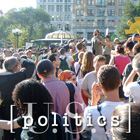
|
CAN 'SHOOT-TO-KILL' BE LEGALLY JUSTIFIED AS A BLANKET OR DEFAULT SECURITY TACTIC? Media coverage related to the shooting of an innocent man on the boarding jetway to a Miami American Airlines flight has failed to take into account the most crucial questions. It has not been sufficiently explored why officials are so determined to defend a policy that appears not to work and behind which there is no clear legal reasoning. Why is "shoot-to-kill" necessary if agents are properly and adequately trained to use firearms and can "shoot-to-incapacitate"? This is the key question in the case of the American Airlines air marshal shooting, in which Rigoberto Alpízar, apparently suffering from bipolar disorder, was killed, despite being unarmed. Why do security officials immediately and without a full investigation determine so conclusively that there was nothing at all inappropriate about the shooting, when an innocent man was killed? It cannot be official policy, nor can it be the strictest interpretation of the law, that government agents are permitted to shoot innocent people simply because they are confused about the nature of a situation. This past summer, only weeks after the shocking London transport bombings of 7 July, police in London gunned down a Brazilian national as terrified passengers watched. Official accounts of the shooting claimed right from the start, before coherent press reports had even emerged as to where exactly it had occurred, that the shooting was justified. Almost every aspect of that initial account has since been shown to be inaccurate, and British citizens and members of Parliament are still calling for a thorough investigation into who in the police administration lied, who knew the stories were lies and whether the effort was an orchestrated cover-up. After vigorous defending the 'shoot-to-kill' policy, even as a majority of UK police say they don't want to be required to carry firearms, "the Met", London's police force, changed the language related to the policy, saying they preferred to 'shoot-to-incapacitate' where possible. In the American Airlines case, the man is reported to have been acting erratically, and to have been carrying something in which he claimed to have a bomb. Air marshals pursued the man down the jetway as he tried to disembark the plane and shot and killed him. Witnesses from the flight report that it happened so quickly, there was hardly time to notice what was taking place or to become afraid. They also testified that the atmosphere was relatively "calm" until the shots were fired, though witnesses may not have seen whatever scuffle may have occurred in the first class cabin toward the front of the plane. One witness said he never heard the word "bomb" at all, but that Alpízar had been agitated and was arguing with his wife, who tried to calm him down. The president of Costa Rica, where Alpízar was born, says he wants the US to carry out a full investigation and report its findings as to the nature of the tragic shooting of the naturalized US citizen. Some have questioned the logic of trying to stop an airplane bombing by ordering the suspected bomber to remain on the plane and raised the issue as to whether it was the agents' own fear of the situation, absent any clear evidence, that led them to fire. Witnesses said Alpízar was desperate to get off the plane, and his wife tried to calm him and keep his behavior from getting out of control. When he made a run for the cabin door, she reportedly ran after him, saying "He's sick. He's sick. He's ill." She reportedly tried to explain he was suffering from a mental condition and was without his medication. Rigoberto Alpízar's brother, Carlos told the Orlando Sentinel "I can’t conceive that the marshals wouldn’t be able to overpower an unarmed single man, especially knowing he had already cleared every security check". The issue of what justified the agents' resorting so suddenly to 'shoot-to-kill', when it was so unclear there was any real peril, must now be central in any official investigation and/or accounting for what happened. After agents killed Alpízar, police reportedly stormed the plane, apparently to secure it against any further threat and to get statements. Jorge Borrelli, one of the passengers, has been quoted as telling the press: "They stuck guns in our faces... They were waving the barrels, shouting, 'Everyone get your hands on the seats! No one move!'" He is reported to have sought to stop Alpízar's wife from continuing toward her dying husband, out of fear she also would be shot and killed. Describing the standoff with police aiming weapons at remaining passengers, Borrelli added "That was the scariest part. I thought, God, if someone freaks out and jumps up, they’re going to start shooting." Other witnesses said the situation did not merit such a violent action. Several were sympathetic to Alpízar's having suffered a psychological condition. The government has given no indication at all that they have any policy oriented toward diffusing a tense situation in order to ascertain the facts or to deal with a disturbed individual. Prior to the 9/11 attacks of 2001, the Air Marshal service reportedly included only 33 expert, trained marhals. After the attacks, an estimated 200,000 or more applications were handed in; the government has classified the existing number of air marshals, saying to reveal the number would compromise national aviation security. When asked if the shooting had been "appropriate", White House press secretary Scott McClellan said "The team of air marshals acted in a way that is consistent with the training that they have received". From a legal standpoint, this reasoning is wholly inadequate: air marshal training is not a legal premise, and laws against unjustified killing still pertain, even to the most highly trained and risk-subject government agents. What's more, saying their actions were "consistent with" training does not conclusively confirm they were trained to act as they did, but may suggest that the government is willing to permit a tragic departure from official policy or from the rule of law. SF IndyMedia reports, in its analysis of media coverage and the veracity of official accounts, that "immediately after 44-year-old Rigoberto Alpízar died on Dec. 7 in a hail of bullets from two air marshals, Dave Adams, a spokesman for the Federal Air Marshal Service, told CNN that Alpízar had shouted 'I have a bomb in my bag'". Much to the contrary, the Orlando Sentinel reported on 9 December that "Seven passengers interviewed by the Orlando Sentinel —seated in both the front and rear of the main passenger cabin— said Alpízar was silent as he ran past them on his way to the exit". The paper also reported that no witness they interviewed corroborated the government's account of what happened before Alpízar was killed. Though the US justice system requires that anyone accused of a crime is "innocent until proven guilty", and clearly the government wants to apply that standard in this case to its agents, it must be noted the 'shoot-to-kill' policy as such requires as fundamental the suspension of the entire judicial system. A suspect can be killed, so goes the logic, simply because an individual agent perceives him to be a threat. Defending such a policy, or the tragic actions it may lead to, unconditionally, without so much as a preliminary inquiry, is dangerously close to condoning summary execution.
Rigoberto Alpízar, whatever his behavior may have indicated, in fact posed no mortal threat to anyone in his vecinity; he was simply attempting to flee an environment which he found mentally intolerable. For whatever reasons, be they related to training, ability or circumstance, the two air marshals present were unable to accurately assess the situation. In their confusion, they chose the most severe and irrevocable response, in what witnesses say was a very short period of time, perhaps too sudden to have permitted a reasoned assessment of the incident. But we must ask, as a people, whether being hurried is adequate reason to override laws against taking human life. What is known now is that an innocent US citizen was shot and killed by agents of the government. The investigation should begin from there. The agents should be presumed innocent, but investigators must take seriously the likelihood that fear and confusion, not justifiable security measures, more likely motivated the killing. While it is understandable that air marshals may experience fear and confusion in a life-threatening situation, it must be bedrock security policy that agents with such special security privileges and responsibilities be trained to meet that challenge and not, under any circumstances, base their actions on fear or confusion. Those emotional states, attributable to an ordinary civilian not trained to do that difficult job, cannot be justification for lethal actions taken by individuals who have knowingly chosen to enter into a potentially lethal profession. Such permission would defy legal standards and open up the possibility for dangerous abuses. It is precisely for that reason that in the UK, where the vast majority of police do not carry firearms, it is police officers themselves who have been fighting policy proposals to expand or even universalize the use of firearms by police. They believe it raises serious ethical concerns and may subject officers to greater peril than is required, or even to inhibit their properly doing their job. So, investigators must examine in great and exhaustive detail how government policy relating to air marshals and their use of firearms is constructed, what the training regimen is, how these two marshals were trained and by whom, and whether any aspect of the process, however minor, suggests that marshals may run afoul of the law as a result of flawed or incomplete training. Ulimately, though media coverage has not tended to frame it this way, the jetway shooting in Miami is an issue of fundamental constitutional rights. It underscores the need for checks and balances in government and for judicial review not only of criminal cases, but of legislation and of executive enforcement of and adherence to existing laws. [s]
RELATED STORY: Leaked IPCC documents suggest early reports about the shooting of Brazilian immigrant Jean Charles de Menezes at Stockwell Underground Station in London on 22 July of this year, were littered with untruths. Perhaps most importantly, the central claim that he had worn a bulky, winter-type coat in summer, thus raising suspicions he might be concealing a suicide bomb vest, appears to be erroneous; in fact, he wore denim jacket... [Full Story] |
|||||||
|
||||||||




